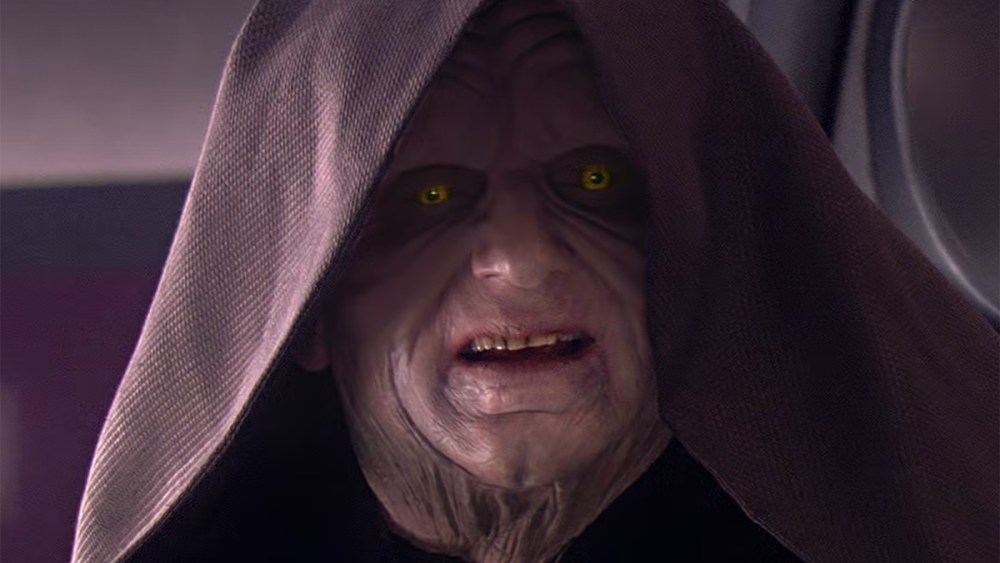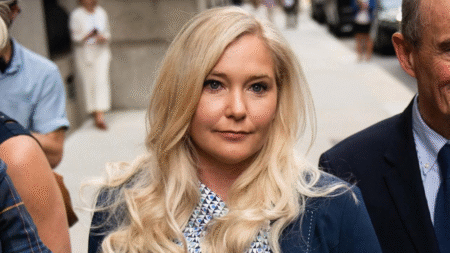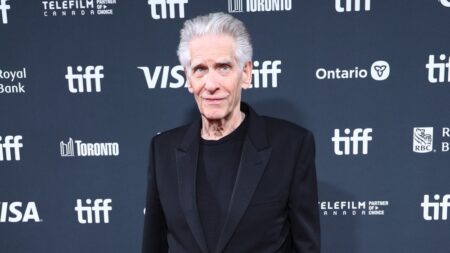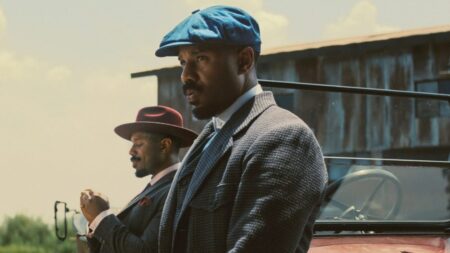Darth Vader might be the face of the Empire in the “Star Wars” saga — but even he has a boss.
The Emperor has existed as long as the franchise itself, from a passing mention in “A New Hope” to his unexpected (and controversial) reappearance in “The Rise of Skywalker.” But the 2005 prequel finale “Revenge of the Sith,” now re-released to theaters and celebrating its 20th anniversary on May 19, forms the inflection point between his benevolent public persona and his true (and truly evil) identity. Remarkably, Scottish actor Ian McDiarmid has inhabited the role for 42 years; along with Anthony Daniels as C-3P0, that ranks among the longest tours of duty in “Star Wars” history.
To commemorate the “Revenge of the Sith” anniversary, McDiarmid spoke with Variety from his flat in London to discuss the character’s climactic pivot, and the process of building his arc after first being cast in the role — replacing late voice actor Clive Revill — for “Return of the Jedi” in 1983. In addition to recalling George Lucas’ marching orders during the original trilogy, McDiarmid explored the psychology of a character whose kindness is a mask concealing his calculating manipulation. He also discussed the canonical and logistical challenges of playing the Emperor at several different ages, and reflected on the legacy — upon his life, much less on screen — of playing one of the most famous villains in film history.
“Revenge of the Sith” marked Palpatine’s true heel turn. Was it more fun playing his duality and manipulation or finally leaning into that unambiguous evil?
The manipulation was always fun. But also, I had more to do in “Revenge of the Sith” — I had more screen time, more time with Hayden [Christensen] — so that was more satisfying. I also had no idea that Palpatine would have power with a weapon, so to find that he was very good — to give my stunt double full credit — with a saber was interesting.
Ian McDiarmid in ‘Revenge of the Sith’
How carefully mapped out was Palpatine’s arc when you were first re-hired to play him in “The Phantom Menace”?
It wasn’t mapped out at all, really. When I first got the part, I had no idea what the world was that I’d be in charge of as the Emperor. So it started off as a big mystery. I had no idea that Palpatine would figure [into the story so heavily]. But by then it so happened that I was young enough to play the younger Senator. When I first met George about it, he said, “Do you know anyone who wants to play an Emperor?” I said, “I think you know the answer to that question.” And then I got the script and realized that he was more than one character, which made it even more fascinating to play — an ordinary, everyday, fairly hypocritical politician with a monster hiding inside his body.
Was there an early mention of the character that clued you in on what you wanted to focus on in your performance?
Not really. Back in 1982, I met George in 10-minute chat over lunchtime. My agent told me if I wanted to be, I could be the emperor of the universe. I knew he was at the center of power. So I speculated in my head about maybe how he got there… But also, it didn’t seem relevant because I died. But the more I did it, I thought it was a really tremendous invention of George’s. … It was fairly obvious to us all that he had more in mind than just an exciting adventure story for kids.
In playing the character later on, was there a sort of reverse-engineering of his decrepitude?
Well, it was supposed to be my age, which was early fifties when I did Palpatine for the first time. So it wasn’t so much that he was aging, but when he got that monstrous face and he was sort of in transition physically as well as mentally, the aging process wasn’t really relevant. The evil process was. It’s like when Dr. Jekyll turned into Mr. Hyde. As I’m approaching his age myself, although the body is failing, the mind is as active as ever. Palpatine certainly had a hyperactive mind.
This is a character who can turn on emotion when needed. What reality are you playing as an actor to be able to tap into those feelings?
Well, he’s a hypocrite, plain and simple — and a very good actor. He’s a performance. He’s only interested in one thing: absolute power. It sounds objective and black and white, but it’s extraordinary. If you think of people who have absolute power or pretty damn near it, you think that’s all they want, really — wealth and to be able to run people. But also, he was a Sith from way back. Now, I don’t really know what that means, but that particular personality is completely different from everybody else. He plays the human, but he isn’t one. Palpatine embodies the dark side. He relishes it. He thinks people who don’t enjoy it or don’t allow themselves to be drawn to it are stupid.
George Lucas’ dialogue is famous for being a little bit stiff. But I feel like that formality serves Palpatine.
I think that’s fair, although underneath I managed to find a lot of wit in it. I mean, obviously he hated the word “friend.” He thought it was stupid that people had friends, because that was a sign of weakness. So when it came to a word like that, I could sort of dish it out with a bit of contempt.

Palpatine (McDiarmid) tells the tragedy of Darth Plagueis the Wise to Anakin Skywalker (Christensen) in ‘Revenge of the Sith’
©20thCentFox/Courtesy Everett Collection
Anakin obviously experienced a lot of trauma in his past. How much of Palpatine’s work manipulating him was aided by that trauma?
I wouldn’t want to quantify it, but that’s right — it’s both. Palpatine sees the spark of ambition, and he cultivates it. In the opera scene when Anakin asks him to help save Padme’s life, the phrase he uses is “Not from a Jedi.” In other words, “You’re going to have to betray everything that you think you stand for in order to join this side. You’ve got to embrace evil and all its totality, otherwise you’ll be no use to yourself” — let alone me. It’s amazing, manipulative stuff. That scene at the opera was, for me anyway, the apotheosis of it. He invites him into his world, to be his right-hand man, and as Palpatine gets physically more frail, Vader will become stronger.
The fight with Mace Windu where Palpatine reveals his true form offered you a great opportunity for scenery chewing. What sort of collaboration did you have with George to modulate the intensity of that moment?
I thought I’d gone much too far, and George said, “No, no, you can go much further.” It’s the moment when the monster becomes available and he is ecstatic with delight because he can lose the hypocritical face. When we were doing “The Phantom Menace,” George said, “You should think of your face as a carapace” — as if we’d made me up, and underneath was the real person. That was great, because to believe that my own face and voice were utterly manufactured was a huge help.
I also rewatched “Return of the Jedi.” The way your character sits in that is kind of funny; he’s got this heavy slouch on the throne. Were there any performance details like that that you brought back for the prequels to plant a seed of what was to come?
Not really. My approach is never what you might call “method.” It’s the words on the page and what they do to me inside. As you know, somebody else was cast as the Emperor in “The Empire Strikes Back,” and they couldn’t do it for some reason. Mary Selway, the casting director, assured George that I could play old, having seen me play the old Howard Hughes — he was called Henry Hackamore — in Sam Shepard’s play “Seduced.” At 38, I’d played a number of parts which are much older than my years, and because I saw the makeup and the cane, I knew I had to be decrepit. But inside, there was this terrible, unbelievable power, which was stronger than anybody else in the universe of the “Star Wars” movies.
You mentioned Clive Revill, who voiced the Emperor before you. He passed away not long ago.
I was very sorry to hear that.
Did you two ever cross paths?
I met him a couple of times. He was a very fine actor. It must have been disappointing to him that he didn’t continue to play him. But of course, he didn’t really play him in the first place. It was a woman in a mask [Marjorie Eaton] and his voice. Interestingly enough, in “Return of the Jedi,” our director Richard Marquand gave me a tape early on and said, “If you can get your voice like Clive’s, George might let you keep it.” I had no idea I wouldn’t be able to use my own voice! I thought if Clive knew what that creature had become or what he looked like, he would be doing something along the lines of what I was doing. So I continued to do my little voice like that; George didn’t say stop, and neither did Richard.
Later we came to re-voice everything in the studio in London, with George and Kathleen Kennedy, who I met for the first time, and indeed, Steven Spielberg, who I met for the first time. And when we did the first few scenes, Steven said, “Oh my God, you’re evil!” I thought, “That’s a relief.”

Ian McDiarmid and Mark Hamill in ‘Return of the Jedi’
Was there a moment when you became convinced that you were done playing this character for the last time?
Oh, yes. I mean, I thought he was killed. So when I got a call to come in and talk about the prequels, to find out about Sidious and all the rest of it, I thought, “I’ve got lucky again,” but I thought this is definitely the finish. And then JJ Abrams called me and said, “He’s coming back.” That was great to do too. Then to find out that I had a granddaughter who was out to get me was very satisfying too — particularly played by Daisy Ridley.
Did anyone explain to you how this character had children in the first place?
There was never any discussion of any of that. It was up to me to work it out in my head. There was talk in “The Phantom Menace” about something called midichlorians, which were involved somehow in Anakin’s birth. George didn’t want to go too deeply into that. But we reckoned it was kind of virgin birth, though one ought not to say that because God knows you get all sorts of complications. Then people ask the slightly embarrassing question about, “Does this evil monster ever have sex?” And we don’t really know the answer to that question either — things in tubes, you think about probably, rather than the awful vision that you might have in your head of this monster ever having a sexual relationship with anybody.
What were the things that you did know coming into “Rise of Skywalker”? What did you have to work out for yourself?
It seemed entirely probable that Palpatine had plan B. Even though he was very, very badly damaged, he would be able to be put it together in some form. When I realized I had a sort of astral wheelchair, that was even better. I just had these four guys who whisked me around the studio; I can’t tell you how much fun that was. Daisy was more worried about that than anything else. And then, of course, we had to devise another makeup look, which was even more grotesque than the previous one.

Adam Driver, Ian McDiarmid and Daisy Ridley in ‘Star Wars: The Rise of Skywalker’
There was, at some point, supposed to be a series based around Palpatine. Was any of that backstory shared with you as part of the character’s mythology?
Just the story of Darth Plagueis the Wise. It’s fairly obvious that my character murdered Plagueis on his road to becoming Palpatine. But beyond that, no. With George, you didn’t discuss anything really. You turn up and you shoot. These films take a long time to make and the pressure is intense for many reasons; of course, George was at the forefront of all of that. So he had all of that to think about day by day. He takes a good deal of trouble over casting; but, once he’s cast, then he likes the actors to get on with it.
For example, the scene at the opera. I’d already done a scene in the makeup in the morning. We went to that in the afternoon and my voice wasn’t in its best shape. It’s probably the most Palpatine had ever spoken in the movie. I was kind of hoarse, so I was worried about that, mainly because I had about four wind machines being driven at me in the scene where he’s turning into the monster. So I was a bit throaty, and we did it about 20 times on a Friday afternoon — not the best time to shoot when everyone wants to get off for the weekend. And, in addition to my throat and the fact it was late in the afternoon on a Friday, there was a birthday party for the first AD, and a man in a gold suit — i.e. Anthony Daniels — was busy getting the champagne ready just off the set on a trolley. Then at one point, a mobile phone went off and the person answered it. So all of that was going on just outside my vision. But oddly enough, when the pressure’s on, the concentration can be even more intense. In a strange way, it may have helped the scene.
There were some adverse reactions to “The Rise of Skywalker.” How did you feel about that backlash to bringing back the Emperor?
Well, there’s always something, isn’t there? I don’t read that stuff and I’m not online. So it’ll only reach me if someone mentions it. I thought there might be a bit of a fuss about bringing him back. But as I said, mine and Palpatine’s logic was entirely reasonable. This man who was horribly maimed thought maybe one day it might happen to him, and we’ve got to have a plan B. I loved the whole idea that he should come back and be even more powerful than he was before. Though this time, he had to be utterly destroyed. So I think he’s dead.

For many of the actors in these huge franchises, it feels like the visibility that it gives them can be a double-edged sword. Has there, over the years, been a sort of reckoning over how helpful — or unhelpful — the role was in terms of people appreciating your versatility as an actor?
Well, over here in the U.K., I was known principally for acting on stage and I’ve done small parts in the odd movie. As far as people over here were concerned, this was just another great part. But maybe because I’m a Scot, Scottish people are fantastically unimpressed, so should you actually get any airs, you’ll soon be cut off at the knees. But most people are very friendly and great fun. The other day, I went to a restaurant just a couple of nights ago up in Scotland, and I went and said, “Do you have a table? I’m sorry I didn’t book.” And he managed to say, “I just never expected the emperor of the universe to walk into our restaurant.” So that was amusing. It’s absurd.
I think it’s now been 42 years that you played this character.
Yes, I think you’re right.
In retrospect, what’s the characteristic that you unexpectedly share after playing him for so long?
I’ve always found deep-rooted anger easier to play than some other things — and that’s what motivates him, a terrible kind of fury and lust for revenge. Now, I don’t have any of that, but I have a kind of understanding of it. I’ve always been fascinated by power. The thing that’s always puzzled me about people when they make a lot of money is that somehow there’s not enough. They need to be richer or more powerful than anybody else, and that seems to be the overriding objective of a lot of people. That fascinates me. And I suppose that’s something I could lean into when I was playing Palpatine, both older and younger.
I’ve been thinking through this entire conversation that in real life, the Emperor is younger than Han Solo. (McDiarmid was born in 1944; Harrison Ford was born in 1942.)
Playing the role has been a tremendous pleasure, all thanks to George — to be part of the first giant story told on film. As I said to you earlier, that’s luck. It just happened out of the blue because somebody else wasn’t available. But sometimes that’s what life’s like.
Or maybe Palpatine’s abilities have translated to you and you were able to manipulate the universe to put yourself in the role?
That’s an interesting theory. Not one that can be tested, unfortunately.
This interview has been edited and condensed.
Read the full article here








